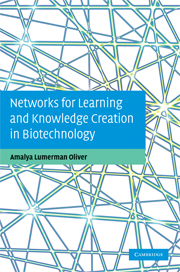Book contents
- Frontmatter
- Contents
- List of figures
- List of tables
- Acknowledgements
- Introduction
- 1 Networks, collaborations, and learning and knowledge creation
- 2 The biotechnology industry through the lenses of organizational and networks scholarship
- 3 New organizational forms for knowledge creation in biotechnology
- 4 Scientific entrepreneurship
- 5 Science and discoveries in the context of private and public knowledge creation and learning
- 6 The search for university–industry collaborations: linear and chaotic networking processes
- 7 Trust in collaborations and the social structure of academic research
- 8 Organizational learning and strategic alliances: recombination and duality of competition and collaboration
- 9 Further directions for understanding interorganizational collaborations and learning
- References
- Index
7 - Trust in collaborations and the social structure of academic research
Published online by Cambridge University Press: 04 July 2009
- Frontmatter
- Contents
- List of figures
- List of tables
- Acknowledgements
- Introduction
- 1 Networks, collaborations, and learning and knowledge creation
- 2 The biotechnology industry through the lenses of organizational and networks scholarship
- 3 New organizational forms for knowledge creation in biotechnology
- 4 Scientific entrepreneurship
- 5 Science and discoveries in the context of private and public knowledge creation and learning
- 6 The search for university–industry collaborations: linear and chaotic networking processes
- 7 Trust in collaborations and the social structure of academic research
- 8 Organizational learning and strategic alliances: recombination and duality of competition and collaboration
- 9 Further directions for understanding interorganizational collaborations and learning
- References
- Index
Summary
Previous research provided some tangible evidence that commercial interests have the potential to, and in fact sometimes do, have an effect on the nature of trust in academic science. By offering a wide range of evidence found in the area of academic biotechnology research, we can examine how the success of commercially oriented collaborative research calls for a number of different forms of trustworthy behavior on the part of collaborators. The argument is that owing to the recombination of commercial interests into academic research a broader form of trust is required to support the research relationship than is required to support the normal academic relationship.
In academic science, trust, in the form of scientific credibility and accountability, plays a crucial and essential role. Trust relations in academia are built on networks of trust relations in which personal experience, reputation and gossip, and institutional norms are the factors which enhance trustworthy behavior. When an established social system is altered because of changes in norms of interests of some of its members it is important to revisit the role of trust in scientific exchanges and the emerged new structure of social and scientific exchanges in academic science. In a previous study Liebeskind and Oliver (1998) suggested that the increasing commercial value of scientific discoveries in molecular biology led to changes in the social structure of this academic field. Our observations were supported with findings from fieldwork and interviews gathered in Israel, the UK, and the USA since 1989.
- Type
- Chapter
- Information
- Networks for Learning and Knowledge Creation in Biotechnology , pp. 169 - 186Publisher: Cambridge University PressPrint publication year: 2009



